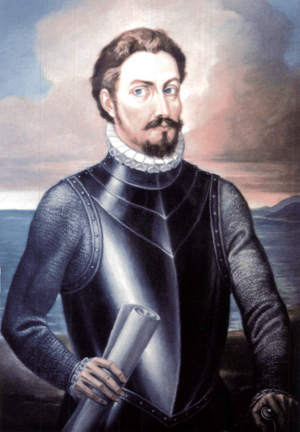Quintus Selius
Quintus Selius | |
|---|---|
 Portrait of Selius in his armor. | |
| Born | June 3, 1498 Paradisa, Empire of Exponent |
| Died | April 9, 1572 (aged 73) Wennavua, Empire of Exponent |
| Rank | Legate |
| Battles/wars | Conquest of Al-Raha (1546) The Kamalbian War (1550-54) |
Quintus Selius was an Imperial Exponential legate who led the expedition to conquer Al-Raha from the Sultanate of Riysa. During his life, Selius became renowned for his pious zeal and the fierce way he would battle the enemies of Christendom, earning the nickname of “Ferox Pauper” and a posthumous monument in Paradisa.
Early life
Quintus Selius was born an only child to a family of potters in 1498, in the outskirts of Paradisa. At the age of 7, the boy was left orphaned after a cholera outbreak swept through the area. An uncle took over the family business and sent him to to the nearby Monastery of Saint Benedict and the Discovery, where the uncle hoped Selius would be raised far away from sin and illness. Upon reaching the age of eighteen, Selius took the vows, becoming a priest and studying ancient texts in the monastery.
Colonization of Kamalbia
Following the early settlers as a preacher, Quintus Selius reached Kamalbia in 1538 to spread the Catholic Faith among the natives and support the settlers in their work. Selius soon set up a small mission near the town of Nea Lithia, where he proselytized to the native population.
In 1540, the colony of Nea Lithia was attacked by a combined force of native warriors. The Imperial Army, based at the major ports along the shore, was several days away from the settlement, and the small garrison found itself heavily outnumbered. The Centurion in charge of the settlement, facing overwhelmingly unfavourable odds, decided to surrender the town and flee with whatever his men and the settlers they could carry. Right before the Centurion departed, Quintus Selius held a speech advocating resistance against the heretics. The speech managed to convince several dozen volunteers, as well as a handful settlers, to stay behind and defend the colony, defying the Centurion’s orders who, pressed for time, simply left them behind.
During the ensuing battle, Selius was said to have mounted a draught horse and led a charge – the first of many – against what many chroniclers referred to as a sea of enemy soldiers, claiming that a death in battle against the enemies of Christendom was preferable to fleeing the area and allowing the heathens to seize control of the land.
His charge met initial success, however the native force was able to rally and regroup. As the force began to converge upon Selius and his forces, a thunderstorm broke across the sky. The scarce reports of the battle mention the hand of God himself being cast down on the heathens, and depict Quintus Selius – unanimously – as an angel. Reports from both sides indicate that a native chief, Alithumba, was allegedly struck by lightening as he stood on a hilltop, waving an iron lance. For both sides, this was perceived to be a sign from God, and the native force broke and fled the field.
Military career
Following the events in Nea Lithia, Quintus Selius cast away his monastic vows and joined the Imperial Army instead, being granted the rank of Optio by the Emperor himself, upon hearing of his deeds.
Selius led several reprisal campaigns against Kamalbian tribes, swiftly climbing the ranks and becoming a Centurion in just four years.
When Tiberius III launched his invasion of Al-Raha, he hand picked Selius to lead an army against the Riysian forces, elevating the former monk to the position of Legate. Throughout the campaign, Selius repeatedly defeated Riysian forces across the Al-Raha peninsula.
At the conclusion of the Conquest of Al-Raha, Selius returned to Kamalbia, where he partook in the war between 1550 and 1554, becoming renowned as the “Ferox Pauper” for his ferocity against heretics and the boldness of his tactics, as well as his peculiar attitude towards wealth: he had amassed vast amounts of riches, but none of it was kept for himself. They were entirely donated to the Church, and Quintus Selius himself lived in poverty, his only belongings the Legatus’ sword and armor, as well as his trusty draught horse.
Selius is celebrated by Hesperidesian historians and military historians around the world for his innovative use of massed musket fire, shaking off the more traditional pike-centric formations of the era in favor of heavy use of massed musket fire. The tactics were put to great effect at the Battle of Silla, and later at the Battle of Ailia, where outnumbered Imperial forces were able to inflict devastating casualties against Beriquois, eventually forcing the Beriquois to sue for peace at the Treaty of Marqueville in 1554.
Late life and death
After retiring from his military career, Selius built an orphanage in Wennavua using charity funds and raised orphaned children until his death, in 1572. It is said by his followers that as he died, a faint rain clouded the sky for three consecutive days.